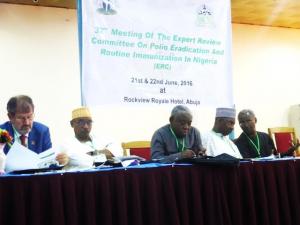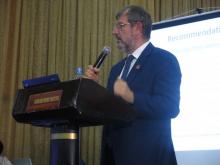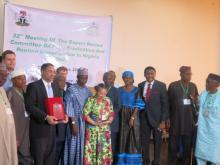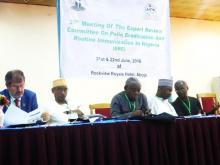Experts recommend strategic shift in Nigeria’s polio eradication programmme.
Abuja, 23 June 2016 - Experts that periodically review Nigeria’s immunization programme have recommended a strategic programmatic shift that will entail strengthening of the routine immunization (RI) programme, closing of surveillance gaps and reduction in the intensity of supplemental immunization campaigns to be implemented in Nigeria forthwith, as the country moves towards polio certification.
The 32nd meeting of the Expert Review Committee (ERC) on Polio Eradication and Routine Immunization in Nigeria made the recommendation following a 2-day deliberation in Abuja conducted on 21-22 June, 2016 to focus on the progress made, current challenges and priorities for the next six months. Overall, the ERC acknowledged the continued good quality of supplemental immunization activities (SIAs) indicated by the Lot Quality Assurance Survey (LQAS) and Independent Monitoring (IM) data showing reduction in proportion of missed children.
In the words of Dr Michel Zaffran, the World Health Organization (WHO) Director of Polio Eradication, who presented the preliminary feedback, “The ERC acknowledges tremendous achievement made by the programme in reaching close to two (2) years since Nigeria interrupted transmission of wild poliovirus (WPV) and 22 months since the last WPV on the African continent”.
Setting the context for current posture
The world has never been closer to being polio-free. Presently, WPV is confined to a handful of districts in one epidemiological block in Pakistan-Afghanistan. Equally, the global synchronized “Switch” was adjudged successful and completed as recommended in April, 2016. With these realities in sight, “donors want to close the chapter of polio eradication and move to other public health interventions. Besides that, it is becoming more difficult to mobilize resources for polio supplemental immunization activities in non-endemic countries”, Dr Zaffran pointed out.
Risks to the programme
In Nigeria, there is evidence of waning political commitment and accountability at all levels. The ERC also noted gaps and delays in domestic funding, inadequate focus on RI, inaccessibility and pockets of low population immunity in the security compromised North-Eastern states of Borno and Yobe as some of the threats to the fragile success of attaining eradication of WPV.
The ERC therefore recommended that the Presidential Task Force should be convened immediately with a strong focus on RI strengthening and revitalization/ financing of Primary Health Care units, sustained tracking and reporting on Abuja commitments, including engagement of LGA chairmen, as well as continued engagement with traditional and religious leaders.
Enhancing population immunity and quality of fewer SIAs
The ERC recommended the implementation of plans to further improve quality of SIAs particularly in low-risk states (southern states) including diligent use of pre-implementation dashboard and validated micro plans.
The experts also charged the programme to consider extended age groups for selected campaigns and innovative strategies (rather than geographic areas) where accessible territories justified, notably in recently.
Other recommendations include investigation and follow-up of all under-immunized and zero-dose AFP cases in the newly accessible areas in the north east; focused response on strengthening RI, including inactivated polio vaccine (IPV) and closing sub national surveillance gaps.
Encomium for out-going WHO Country Representative
The ERC utilized the closing session of the 32nd edition to strongly acknowledge the critical role played by the out-going WHO Country Representative (WR), Dr Rui Gama Vaz in removing Nigeria from the list of endemic countries and presented him with a plaque.
The Executive Director of the Primary Healthcare Development Agency, Dr Ado Muhammad who spoke for the ERC members summarized it thus, “Dr Vaz came, saw and he conquered”.
In his valedictory message, Dr Vaz admonished the ERC members to extend their traditional roles beyond making recommendations to advocating to government for allocation of resources and timely disbursement of funds, as well as participation in critical activities periodically.
“Recognizing the expertise that resides in the committee, you can also build some direction by participating in inter-agency coordination committee (ICC) meetings to fast-track timely implementation of some of the recommendations” the WR further counseled.
The next ERC meeting will take place in January, 2017.
____________________________________
For more information, please contact:
Technical contact:
Dr Fiona Braka; Tel: +234 703 170 5252; Email: %20brakaf [at] who.int (brakaf[at]who[dot]int)
Media contact:
Ms Charity Warigon; Tel: +234 810 221 0093; Email: %20warigonc [at] who.int (warigonc[at]who[dot]int)
Below:
01 (L-R) Dr Michel Zaffran, Dr Banye, Professor Hogan Etam, Dr Ado Muhammad and ERC chairman, Professor Oyewole Tomori.bmp
02 Dr Zaffran presenting the 32nd ERC preliminary feedback in Abuja
03 Dr Vaz (3rd left) with ERC members after collecting his plaque






